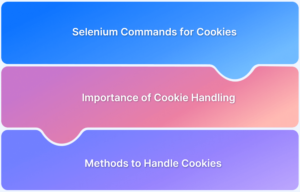One important aspect of web testing is managing browser cookies and sessions, as they hold essential information about user interactions, preferences, and authentication. By mastering these techniques, testers can simulate user interactions more effectively and ensure that web applications behave as expected. Whether you’re pursuing a Selenium Testing Course or already working in software testing, understanding how to manage cookies and sessions in Selenium is fundamental. Explore how Selenium interacts with cookies and sessions, provide tips for their management, and demonstrate how these concepts apply to real-world automation testing.

Understanding Browser Cookies in Selenium

Cookies store information such as session data, user preferences, and tracking details. Managing cookies in Selenium involves getting, setting, deleting, and handling cookies efficiently during test cases.
Basic Cookie Operations in Selenium:
- Get Cookies: Retrieve all cookies from the current session.
- Set Cookies: Add cookies to the browser’s session.
- Delete Cookies: Remove specific cookies or clear all cookies.
Here is how you can manage cookies in Selenium:
// Get all cookies
Set<Cookie> cookies = driver.manage().getCookies();
// Add a new cookie
Cookie cookie = new Cookie(“name”, “value”);
driver.manage().addCookie(cookie);
// Delete a cookie by name
driver.manage().deleteCookieNamed(“name”);
// Delete all cookies
driver.manage().deleteAllCookies();
By performing these operations, you can simulate different user sessions and ensure the application responds accordingly. Enrolling in Software Testing Training empowers you to master these techniques, enabling you to effectively test applications under varied scenarios and deliver reliable results.
Handling Browser Sessions in Selenium
Sessions are crucial for maintaining user state across multiple pages or visits. Selenium allows you to manage sessions, which can simulate various user interactions like login, authentication, and session persistence.
How to Handle Sessions:
- Session Persistence: Maintain the session across multiple tests.
- Session Management: Use session IDs to identify and reuse active sessions during automated tests.
Selenium can manage sessions via browser cookies, where cookies store session IDs to authenticate users across different pages. Here’s an example of how to retrieve the session ID:
// Get session ID
String sessionId = ((RemoteWebDriver) driver).getSessionId().toString();
Why Cookie and Session Management is Crucial?
Effective cookie and session management is critical for simulating real-world user behavior. For instance, many web applications rely on cookies for user login states, preferences, and shopping cart contents. Automated tests that can handle cookies and sessions correctly ensure that the application functions as expected under various scenarios.
Benefits:
- Persistence Testing: Validate that cookies and session data persist correctly across browser sessions.
- Authentication: Test scenarios that require login or token-based authentication.
- Statefulness: Ensure the application retains the user’s state, improving the accuracy of automated tests.
By enrolling in Software Testing Training, you can gain hands-on expertise in these advanced testing techniques. Such training equips you with the knowledge to implement persistence testing effectively, ensuring high-quality application performance and user satisfaction.
Cookies and Sessions in API Testing
While managing cookies and sessions is commonly used in web applications, it’s also crucial in API testing. Often, APIs depend on session management for authentication or state handling.
In API testing, you can simulate the behavior of cookies and sessions to verify how API endpoints behave when sessions are active or expired. An API Testing Course helps testers understand how to implement such tests, where session data and cookies play an essential role in maintaining the interaction flow.
Popular Tools and Techniques for Managing Cookies and Sessions
When it comes to managing cookies and sessions in Selenium, several techniques and tools can simplify the process:

| Tool | Purpose | Example Use Case |
| Selenium WebDriver | Handles browser cookies and sessions | Automates adding, deleting, and getting cookies |
| Browser DevTools | Inspect and manipulate cookies directly in the browser | Test cookie values in real-time |
| Postman | API testing with session/cookie support | Test REST APIs with session data |
Whether you’re taking a Selenium Testing Course or involved in a broader Software Testing Course, gaining hands-on experience with these concepts enhances your ability to test real-world applications.
Conclusion
Mastering the handling of cookies and sessions in Selenium is an integral part of automated web application testing. Additionally, integrating these skills with API Testing knowledge ensures comprehensive testing that covers both web and API layers. By efficiently managing cookies and sessions, testers can simulate more realistic user interactions and ensure the application’s reliability across different test scenarios.
